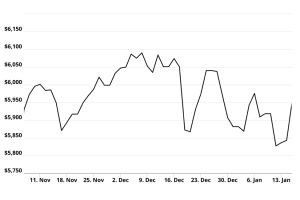
Retail stocks shook the earnings landscape with a few notable Q3 earnings surprises. The trend was not only seen in retail stock earnings but also in a broader surprise across the S&P 500. A staggering 82% of companies beat estimates, surpassing five-year and 10-year averages.
The blended earnings growth rate for Q3 2023 recorded a 4.3% rise, marking the first quarter of growth since Q3 2022. Revenue also increased by 2.4% to register its 11th straight quarter of growth. Within the broader context, retail stock earnings still stood out as the top performer.
Broadline retail, a subset of consumer discretionary, recorded a whopping 324% earnings growth year-over-year, the highest at the industry level. Consumer discretionary itself experienced the second-highest earnings growth year-over-year at 41.8%. But if it weren’t for Amazon (NASDAQ:AMZN), the blended earnings growth rate would drop to 23.9% from 41.8%. And retail stock earnings wouldn’t have been much of a Q3 earnings surprise at all.
In fact, it wasn’t just Amazon that surprised the retail stock earnings landscape. Let’s dive into how these three retail stocks outperformed expectations.
Amazon (AMZN)

In Q3 2023, Amazon emerged as a key player in the retail sector, beating earnings estimates with 94 cents versus the projected 59 cents. The company’s revenue was $143.1 billion, marking a 13% year-over-year increase.
Amazon Web Services (AWS), which brought in a revenue of $23.1 billion, up 12%, was a standout contributor to the retail stock earnings. The cloud division grew despite Amazon’s conservative approach toward artificial intelligence (AI), suggesting sustainable, organic growth outside the AI “bubble.” However, AWS’ robust performance could raise concerns if Amazon is forced to separate the division.
Perhaps the biggest Q3 earnings surprise for the retail stock was the advertising sector. It registered $12.1 billion, representing 26% YOY growth. Since advertising spend typically elevates toward the year’s end, it could further boost Amazon’s growth. The third quarter saw the second-best operating margin ever, a result attributable to CEO Andy Jassy’s aggressive cost-cutting that garnered praise from analysts.
Target (TGT)

Yet another Q3 earnings surprise was set by Target (NYSE:TGT). The retailer outperformed its usual competitor, Walmart (NYSE:WMT), in its retail stock earnings. The company’s earnings rose significantly, reaching adjusted earnings per share of $2.10 as opposed to the expected -$1.47. This marks the biggest rise since pre-pandemic times.
The beat was largely attributed to Target’s strategic inventory management and cost-cutting measures. The company reduced inventory value by 13.9% YOY to $14.73 billion while remaining “well-stocked” for the upcoming season. Interestingly, its CEO Brian Cornell indicated customers’ preference for locked-up merchandise contributed to cost reductions.
Target anticipates a slow holiday season, tempering expectations for the upcoming quarter. Still, it plans to offer more than 10,000 new items for the season, with thousands of gifts under $25 and “exclusive-to-Target” items across various categories.
Macy’s (M)

Despite the inflationary environment, Macy’s (NYSE:M) delivered surprise EPS of 21 cents in Q3 compared to the 0 cents expected, suggesting U.S. consumers have cash to spend away from bargains. Although overall sales declined 7% to $4.86 billion, the retail stock earnings exceeded Wall Street expectations of $4.82 billion.
In fact, high-end products outperformed in sales, implying a shift in consumer behavior. The company experienced a 5.9% YOY decline in merchandise inventories to $6.03 billion. Additionally, Macy’s improved its gross margin to 40.3% from 38.7%.
Based on the results, Macy’s has raised its outlook for the end of the year, ascertaining confidence to weather a challenging landscape in the retail stocks sector. Net sales are projected between $22.9 billion and $23.2 billion, up from $22.8 billion. Comparable owned-plus-licensed sales are expected to decrease to 7% versus 7.5% compared with 2022. Adjusted diluted EPS is estimated from $2.88 to $3.13 instead of $2.70 to $3.20.
On the date of publication, Stavros Tousios did not have (either directly or indirectly) any positions in the securities mentioned in this article. The opinions expressed in this article are those of the writer, subject to the InvestorPlace.com Publishing Guidelines.




